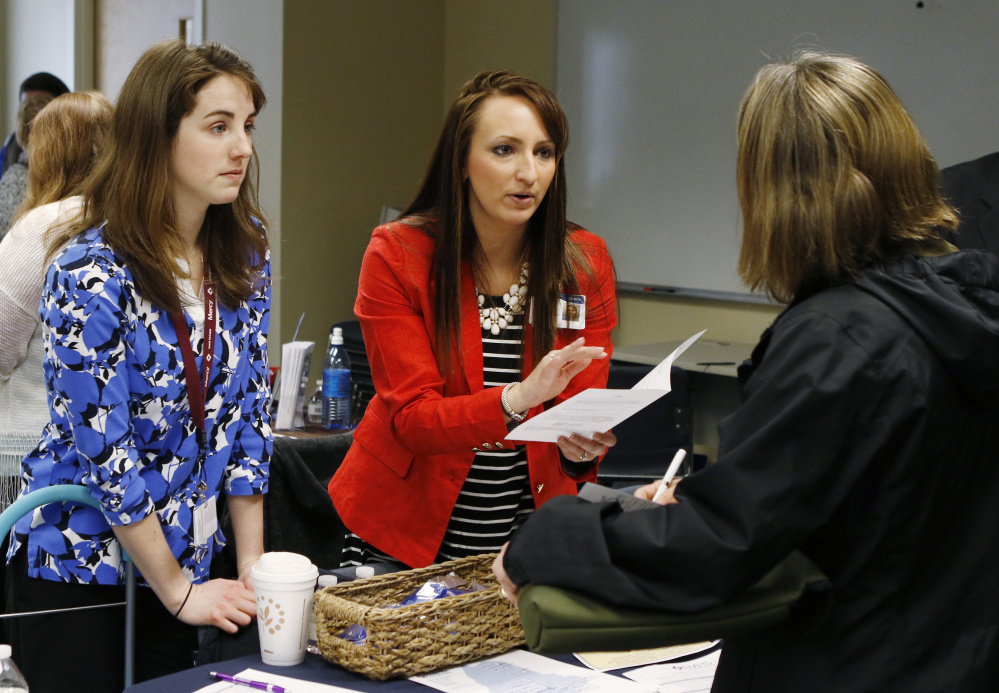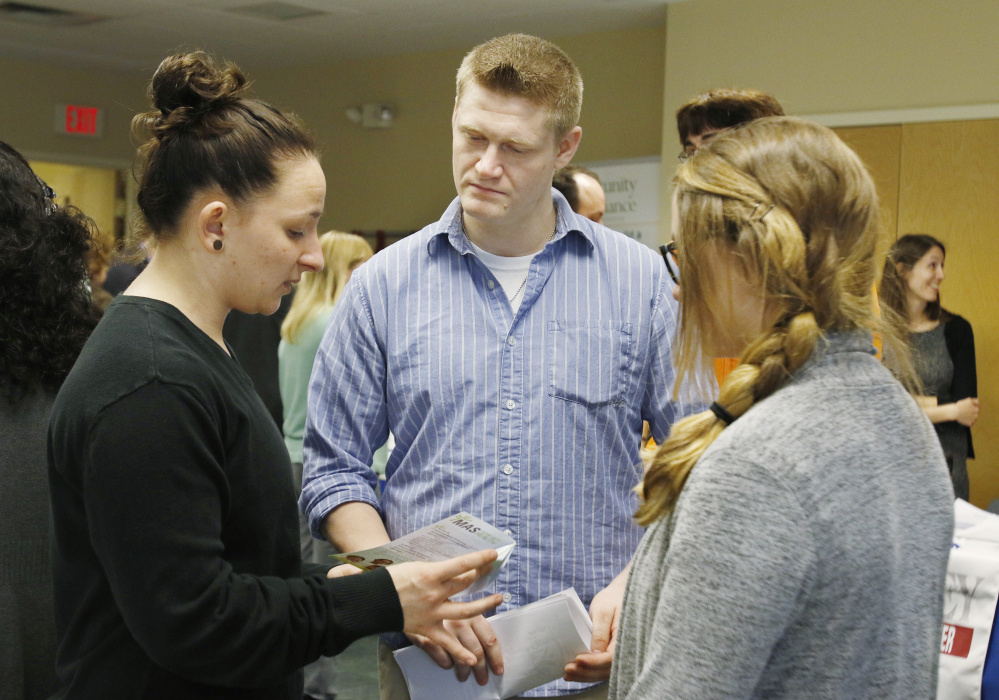BRUNSWICK — Mara Steinhardt didn’t mind sharing what she believes really forced Merrymeeting Behavioral Health Services to abruptly close two weeks ago.
She didn’t have much to lose, she figured, since she’d already lost her job.
“We had been hearing about financial problems for a while,” Steinhardt said Monday at a job fair in Brunswick hosted by the Maine Department of Labor.
The timing of the closure seemed “too perfect,” she said. “I think they ran it into the ground and then used the changes to Section 17 (MaineCare services) as cover” for closing the operation.
Steinhardt, 26, a caseworker for about four years, was among 170 people let go by Merrymeeting this month. “I think they pulled the rug out from us, not just the employees, but our clients,” she said.
The Brunswick-based agency that had provided care to individuals with mental illness announced late last month that it could no longer stay open because of proposed changes that would restrict who is eligible to receive certain services.
Department of Health and Human Services officials have said the changes to Section 17 of MaineCare – which outlines community support services for the mentally ill – were made so MaineCare clients would receive only the services appropriate for their diagnoses and not services that might be redundant or detrimental to their treatment. Community support includes services that help mentally ill patients with daily living activities, such as doing laundry, shopping for groceries, socializing and taking medications.
Under the changes, which took effect Friday, only patients with schizophrenia or schizo-affective disorders would automatically qualify for services under Section 17. DHHS will allow certain exceptions, including recent hospitalization or if a patient’s doctor provides evidence that the person needs the services.
Merrymeeting had said it would close April 8, when the changes went into effect, but then abruptly shut its doors April 1, one week early. Executive Director James Talbott, in an email to employees, said he was forced to close early because a “media frenzy” caused Merrymeeting’s bank to freeze its accounts.
But state officials – and former employees – don’t buy that explanation. DHHS spokeswoman Samantha Edwards said this month that Merrymeeting closed without knowing what the impact of the Section 17 changes would be.
Talbott has not responded to questions about the agency’s finances.
Dozens of people – including many former Merrymeeting employees – attended the fair to inquire about possible jobs at the 38 employers in attendance.
The job fair was put on as part of the Maine Department of Labor’s Rapid Response program, which assists workers affected by sudden layoffs. John Wagner, a department CareerCenter consultant, said Monday’s event was well-attended by both employers and job seekers, especially given how quickly it was put together.
Many other Merrymeeting employees who attended said they were shocked by the agency’s sudden closure, but most didn’t want to speculate about what might have caused it. Those who were most upset didn’t want to give their names.
Lois Dersham, a Merrymeeting employee for five years, felt blindsided by the closure and said many of her co-workers were similarly upset.
“I’d like to find a similar job, but now I worry a little about the field I’m in,” she said.
Donald James, who had worked for Merrymeeting for about eight months, was sad because he lost a job he really liked. He hoped Monday’s job fair might steer him toward something similar.
“I’ve done a bunch of jobs,” said James, 30. “But there is nothing better than being able to help people. For some, we’re all they have.”
Steinhardt also said she was more worried about her former clients than herself.
“I’ll find another job,” she said. “But our clients are a mess without that support. We’re the only thing keeping some people out of a hospital or from harming themselves.”
Some former Merrymeeting clients will be able to get services from another agency, but Steinhardt said she is worried about the gap. It’s not just a simple transition from one agency to another, she said.
Hundreds of mental health advocates, patients and counselors shared similar concerns at a legislative publichearing at the State House in Augusta this month to protest the Section 17 changes.
One of the people who spoke, state Sen. Cathy Breen of Falmouth, said her 21-year-old daughter received services from Merrymeeting. Because her daughter has a diagnosis of schizophrenia, she is still eligible for services elsewhere, but Breen said finding an alternative would be a challenge.
“For seven hours a day, she receives support in our home and community. That support helps her live a stable life,” Breen said. “But her stability remains so precarious and fragile that she cannot be safely left alone.”
Send questions/comments to the editors.






Comments are no longer available on this story